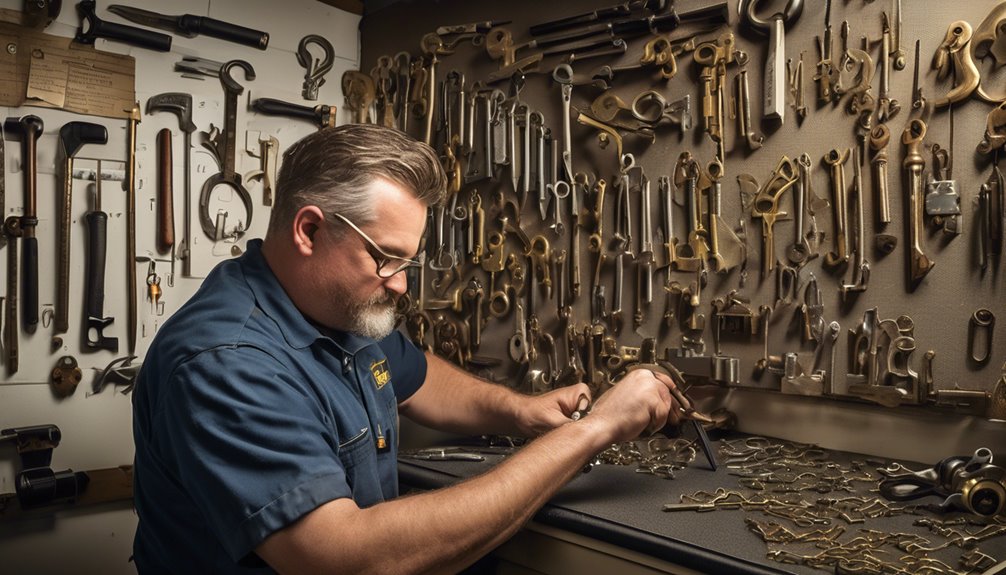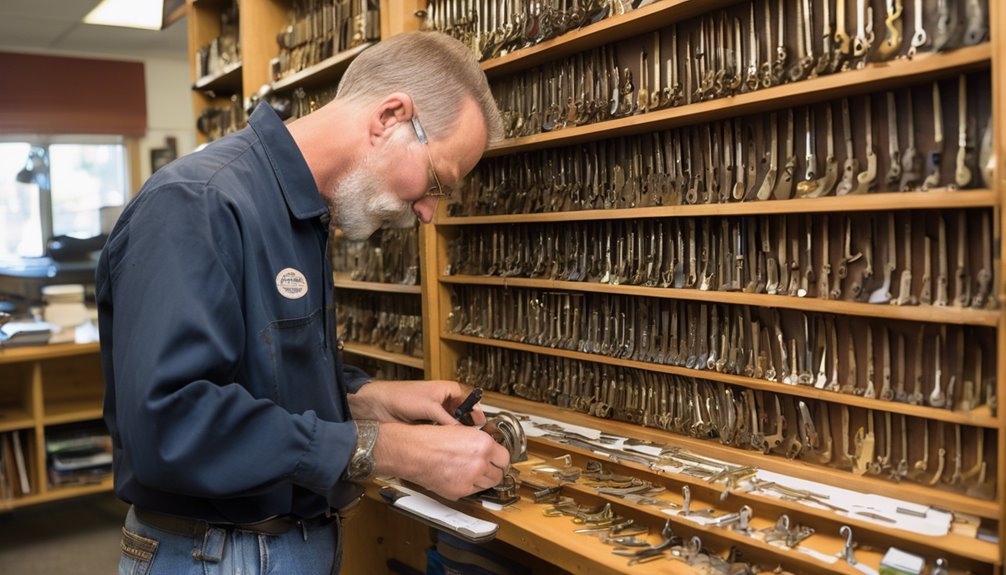Did you know that the locksmithing industry in Virginia is projected to grow by 8% over the next decade? This means there’s a solid opportunity for those looking to enter this field. To get started, you’ll need to complete specific training and understand the licensing process. What steps do you need to take to guarantee you meet all the requirements? Let’s explore the path to becoming a licensed locksmith in Virginia.
Key Takeaways
- Complete an 18-hour entry-level training course covering locksmithing and public safety codes.
- Pass a written exam on locksmithing topics to demonstrate your knowledge.
- Undergo a criminal history check, including fingerprinting, to ensure eligibility.
- Submit an online application with a $25 fee and work for 90 days while awaiting approval.
- Complete a 4-hour continuing education course every two years for license renewal.
Understanding Locksmith Services in Virginia

When you think about locksmith services in Virginia, it’s important to know that they encompass a wide range of tasks. These services include selling, servicing, repairing, and rekeying locks, programming keys, and bypassing locking mechanisms.
The Virginia Department of Criminal Justice Services (DCJS) outlines that anyone representing themselves as a locksmith must adhere to specific definitions and regulations relating to roles such as lock technicians and safe technicians. All locksmiths must complete 18 hours of locksmith training to obtain locksmith licenses, ensuring they meet the state’s standards.
Additionally, electronic security technicians play a crucial role in modern locksmithing, further expanding the profession’s scope. Compliance with Chapter 172 of the Code of Virginia is essential for all practicing locksmiths.
Training and Education Requirements
To become a locksmith in Virginia, you need to complete specific training and education requirements that lay the foundation for your career.
Start by enrolling in an 18-hour entry-level training course approved by the Virginia Department of Criminal Justice Services (DCJS). This training course covers essential topics like the Code of Virginia, locksmith orientation, and public safety codes.
After finishing the training requirements, you’ll need to pass a written exam focused on technical applications relevant to locksmithing.
To obtain your locksmith license, successfully passing a written exam on technical locksmithing applications is essential.
Remember, continuing education is also vital; you must complete a mandatory 4-hour course for license renewal to stay updated on industry standards.
With hands-on experiences and mentorship from experienced instructors, you’ll be well-equipped to pursue your locksmith license.
Steps to Obtain Your Locksmith License

Obtaining your locksmith license in Virginia involves several key steps that guarantee you’re prepared for the demands of the profession.
First, complete an 18-hour entry-level training certification and pass a written exam covering essential topics, including public safety codes. You’ll need to undergo a criminal history check, including fingerprinting via Field Print Virginia, as any felony or misdemeanor could disqualify you.
Next, submit your license application online with a $25 fee. While your application processes, you can work for 90 consecutive days in the locksmith business.
Once licensed, remember to take a 4-hour continuing education course every two years to stay current, especially if you plan to engage in Electronic Security Sales.
Business Compliance and Regulations
Once you’re licensed, understanding business compliance and regulations is essential to operating successfully as a locksmith in Virginia.
Your locksmith business must be licensed under the private security services category, meaning you need to meet the requirements before applying. You’ll also need a physical address in Virginia for registration—P.O. boxes won’t cut it.
Compliance agents play a vital role, as they guarantee you adhere to administrative requirements; they must complete the 12E Compliance Agent Entry-Level training.
Display your business license prominently for public inspection and update the Department of Criminal Justice Services (DCJS) with any changes in your business name or address.
Finally, remember to maintain employee records for at least three years after termination.
Continuing Education and License Renewal

Staying current with industry standards is essential for locksmiths in Virginia, as it directly impacts your ability to maintain licensure. To keep your license active, you need to complete a 4-hour continuing education course every two years. You also must submit your renewal applications at least 30 days before your license expires.
Here’s a quick overview of key points:
| Requirement | Details |
|---|---|
| Continuing Education | 4-hour course every two years |
| Renewal Application Deadline | At least 30 days before expiration |
| Approved Training Schools | Various options available |
| Compliance Audits | Regular checks on advertising and practices |
Failure to comply can result in penalties, including fines or license revocation, so stay informed and proactive!
Frequently Asked Questions
Does Virginia Require a Locksmith License?
Yes, Virginia does require a locksmith license if you’re providing locksmith services like selling, servicing, or rekeying locks.
To get this license, you’ll need to complete an 18-hour entry-level training certification and pass a licensing exam. A criminal background check, including fingerprinting, is mandatory, and any convictions must be disclosed.
The application fee is $25, and you must submit your application online through the Virginia Department of Criminal Justice Services.
Do Locksmiths Make Good Money?
If you’re considering a career in locksmithing, you’ll find it can be quite a lucrative endeavor.
Many locksmiths earn around $48,000 annually, but with experience and specialization, you could easily see your earnings soar beyond $70,000, especially in bustling areas.
Plus, the flexible hours mean you can juggle multiple jobs, maximizing your income potential.
With increasing security concerns, skilled locksmiths are in high demand, paving the way for even more opportunities.
How Long Does It Take to Learn to Be a Locksmith?
It usually takes a few days to complete the mandatory entry-level training, which is 18 hours long.
After that, you’ll need to study for and pass a written exam, which can take additional time depending on your preparation.
Overall, you could be ready to start working within a few weeks, especially since you can work with a pending application for 90 days.
Ongoing education is also necessary to keep your skills sharp.
Do You Need a License to Become a Locksmith?
Yes, you need a license to become a locksmith.
It’s crucial to complete specific training and pass a background check before you can apply. You’ll also pay a small fee when submitting your application.
While waiting for your license approval, you can actually start working as a locksmith for up to 90 days.








